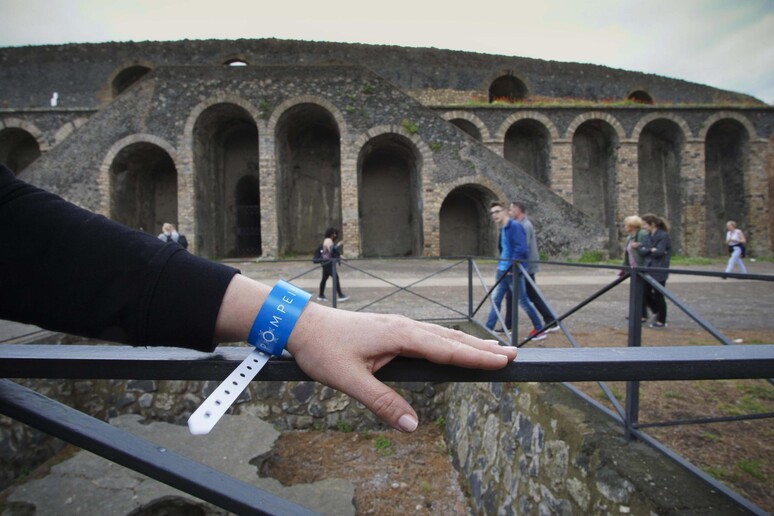Pompeii is the first
archaeological site in Italy to activate an "entrance/exit
bracelet", an electronic device made of special paper and worn
on the wrist that allows visitors to enter the site up to three
times on the same day.
On Tuesday, 35 tourists tried out the bracelets for the
first time, and the number of tourists requesting the bracelets
is expected to increase daily as news of their usage spreads.
The bracelets can be requested at the amphitheatre entrance
ticket office, where a special reader is installed for the
bracelets.
The opportunity to leave and re-enter up to three times
gives visitors a chance to enjoy the site in intervals with
walks around the external areas of the site, shopping, getting a
bite to eat, or sightseeing at places like the Shrine of the
Virgin of the Rosary.
Once the visitor has used up the three entrances, it
deactivates, and it is no longer active the following day.
The bracelet is made of magnetised cardstock using
radio-frequency identification (RFID) technology, which prevents
counterfeiting or trading bracelets with other visitors.
The hope is that the new bracelet will help the local
tourist economy in the city of Pompeii, which has always
suffered from a type of quick-visit tourism from which it can't
seem to break free.
Gianluca Machetti, president of the Pompeii branch of
retailers' association Confesercenti, is skeptical about the
bracelet's potential to boost sales.
"Our real problem is the management of the tourist influx,"
Machetti said.
"The majority of visitors to the archaeological site are
groups of cruise passengers who are off-loaded by the thousands
at Porta Marina and from there, they leave again after two hours
at the site. They don't have time for a restaurant or for
shopping, and they don't visit the city, they just see its name
on a sign on the highway. The most that the bracelet can do is
permit a family that has already organised a similar day on
their own, that is, a visit to the site and then a local
restaurant".
Business owners in Pompeii would eventually like to see the
bracelet's use extended over a two-day period.
"That way, just as they already do with theme parks, tour
operators could organise tourism packages for groups that
include an overnight stay in the area. But, in the meantime, the
local administration could do something, offering a
reduced-price bus ticket for those who plan to eat in a local
restaurant. Or, even forcing tour buses to park in a place other
than the site entrance, so that the tour operators would have to
take groups through the city centre. There needs to be more
dialogue with the local economic structure. But it seems as if
we aren't able to make anyone understand this need, to ensure
everyone necessary growth".
ALL RIGHTS RESERVED © Copyright ANSA











